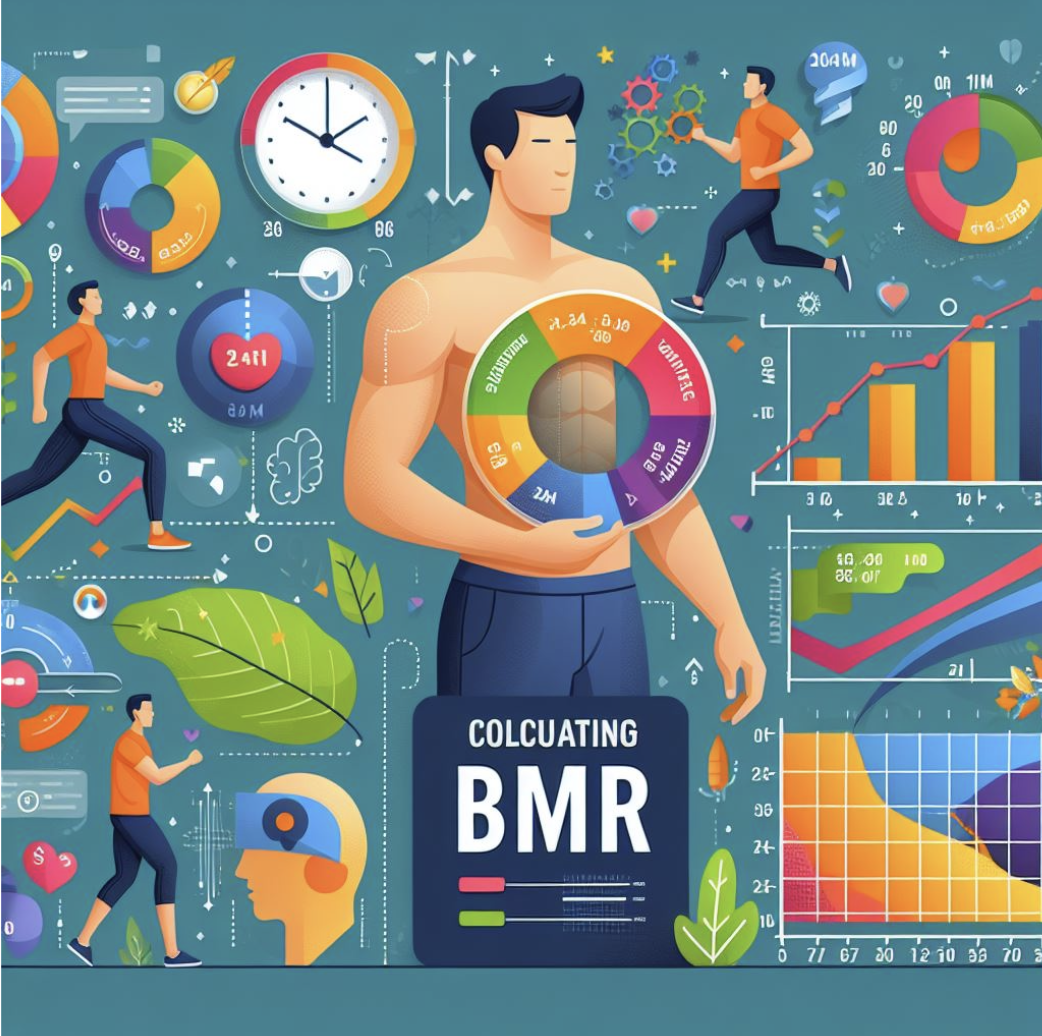Unlock Your Body’s Potential: Understanding Basal Metabolic Rate
Introduction
Hi there, health fans! Have you ever wondered why your fitness buddy can eat a whole pizza without gaining a pound? Meanwhile, that piece of cheesecake for you feels like a dream. The only result is tighter jeans. Well it’s not just luck, it's understanding the secret agent of our bodies – Basal Metabolic Rate (BMR). It's the secret undercover calorie burner that never sleeps. It works 24 hours a day to keep you alive and alert. So, now, let 's see the wonderful world of BMR, where each calorie adds up - but not all calories are equal.
What is Basal Metabolic Rate (BMR)?
Imagine your body as a smartphone. Even when you’re not using it, it’s quietly sipping power to keep the essential apps running – that’s your BMR at work. It’s the minimum number of calories your body needs to function at rest. From keeping your heart beating to blinking your eyes, BMR is the silent hero behind the scenes. And here’s the kicker – it’s unique to everyone! That’s right, your BMR is as personal as your fingerprint, shaped by your age, sex, weight, and height.
BMR calculator: Calculate your basal metabolic rate
The Science behind BMR?
Let’s get a bit nerdy and talk science. Your BMR isn’t just a random number; it’s a calculated expression of your body’s energy needs. It’s influenced by your thyroid function, muscle mass, and even the temperature outside. And it’s not static – oh no, it changes! Lose weight, gain muscle, or just grow older, and your BMR adapts. It’s like your body’s own personal stock market, constantly fluctuating with life’s ups and downs.
Why BMR Matters for Weight Management
If you’re on a mission to manage your weight, knowing your BMR is like having a map in a treasure hunt. It tells you how many calories you need to maintain your current weight, so you can plan your diet and exercise accordingly. Want to lose weight? Eat fewer calories than your BMR. Bulking up? Eat more. It’s like having a cheat sheet for your body’s calorie exam.
How to Calculate Your BMR
Now, let’s talk about calculating your BMR. Our free BMR calculator is like your friendly neighborhood Spider-Man, swinging in to save the day. It uses well-established formulas to estimate your daily calorie needs, and all it asks for is a few simple details about you. No payment, no subscription – just pure, helpful science at your fingertips.
Certainly! These equations that I mentioned are known are used to estimate an individual’s Basal Metabolic Rate (BMR). :
Harris-Benedict Equation:
-
- For Men:
BMR = (88.4 + 13.4 × weight in kg) + (4.8 × height in cm) − (5.68 × age) - For Women:
BMR = (447.6 + 9.25 × weight in kg) + (3.10 × height in cm) − (4.33 × age)
- For Men:
Harris-Benedict Equation:
-
- For Men:
BMR = (10 × weight in kg) + (6.25 × height in cm) − (5 × age in years) + 5 - For Women:
BMR = (10 × weight in kg) + (6.25 × height in cm) − (5 × age in years) − 161
- For Men:
Katch-McArdle Formula:
BMR = 370 + (21.6 × lean body mass in kg)
Factors Affecting Your BMR
Age and BMR: What Happens as We Grow Older?
As the years tick by, you might notice your metabolism isn’t what it used to be. That’s because, with age, our BMR tends to slow down. It’s like your body decides to become more ‘energy-efficient’ and needs fewer calories to keep running. But don’t worry, it’s not all doom and gloom. With the right diet and exercise, you can keep that metabolic fire burning bright!
Gender Differences in Metabolism
Men and women are different in many ways, and metabolism is no exception. Typically, men have a higher BMR compared to women. Why? It’s all down to body composition. Men usually have more muscle mass, which burns more calories than fat, even at rest. So ladies and gents, remember, when it comes to BMR, we’re playing on different fields.
The Impact of Muscle Mass on BMR
Muscle mass is like the engine size in a car – the bigger it is, the more fuel it burns. The more muscle you have, the higher your BMR will be. It’s a fantastic reason to include strength training in your fitness routine. Not only do you get stronger, but you also turn your body into a calorie-burning powerhouse.
Optimizing Your BMR
Nutrition: Fueling Your Metabolic Engine
What you eat matters just as much as how much you eat. To keep your metabolic engine purring, you need high-quality fuel. That means plenty of proteins, healthy fats, and complex carbs. Think of it as premium gasoline for your body – it’ll thank you with better performance and efficiency.
Exercise: Revving Up Your BMR
If you want to boost your BMR, exercise is your best friend. High-intensity workouts and strength training are like hitting the turbo button on your metabolism. They not only burn calories during the workout but also give you the after burn effect, keeping your calorie burn high even after you’ve left the gym.
Advanced BMR Considerations
The Role of Hormones in BMR
Hormones are the unsung heroes of metabolism. They regulate everything from your appetite to how your body stores fat. Thyroid hormones, in particular, play a crucial role in setting your BMR. Keeping these hormonal conductors in harmony is key to a healthy metabolism.
BMR and Chronic Health Conditions
If you’re dealing with a chronic health condition, it can affect your BMR. Conditions such as hypothyroidism or Cushing’s syndrome can slow down your metabolism. This can make weight management more challenging. But with proper medical guidance and lifestyle adjustments, you can take control.
Conclusion: Your Path to a Healthier You
Understanding and optimizing your BMR isn’t just about numbers; it’s about empowering yourself to live your best life. It’s about making informed choices that lead to a healthier, happier you. So, take the knowledge you’ve gained, apply it, and watch as your body transforms. Remember, every step you take is a step towards a more vibrant you.
Frequently asked questions (FAQs) about BMR:
1. Does eating less always increase my Basal Metabolic Rate (BMR)?
It’s a common misconception that eating less will always ramp up your metabolism. However, the truth is a bit more complex. When you drastically cut down on calories, your body might enter a conservation mode, often referred to as ‘starvation mode. This is a survival mechanism where your body slows down its metabolic rate to conserve energy for vital functions. So, rather than boosting your BMR, eating too little can actually decrease it.
2. Are all calories equal when it comes to BMR?
If you’ve ever thought that a calorie is just a calorie, it’s time to think again. Your body processes different types of food in distinct ways. Nutrient-rich foods like vegetables, fruits, and lean proteins can boost your BMR, while sugary snacks and junk food can lower it. So, when it comes to BMR and overall health, the quality of calories matters just as much as the quantity.
3. Will skipping meals help boost my BMR and lead to weight loss?
Skipping meals might seem like a quick fix for weight loss, but it’s not the best strategy for boosting your BMR. When you skip meals, your body can perceive it as a signal of food scarcity and may slow down your metabolism to conserve energy. This can actually make it harder to lose weight. It’s better to eat regular, balanced meals to keep your metabolism steady.
4. Can I rely on BMR calculations alone for an effective weight loss plan?
While BMR calculations provide a valuable starting point, they’re just one piece of the puzzle. Your total daily energy expenditure (TDEE) is also influenced by physical activity, the thermic effect of food (TEF), and non-exercise activity thermogenesis (NEAT). For an effective weight loss plan, consider all these factors in addition to your BMR.
5. Does a higher BMR mean a healthier body?
A higher BMR means your body uses more energy at rest, which can be associated with a higher lean muscle mass. However, a ‘healthy’ BMR varies from person to person and depends on many factors, including age, sex, weight, and height. It’s important to focus on overall health and fitness rather than just aiming for a high BMR.

Johon Lark
a wellness virtuoso, curates health blogs with a blend of expertise and inspiration. Embark on a transformative journey with Johon, where each post is a stepping stone to a healthier and happier lifestyle.
Johon Lark